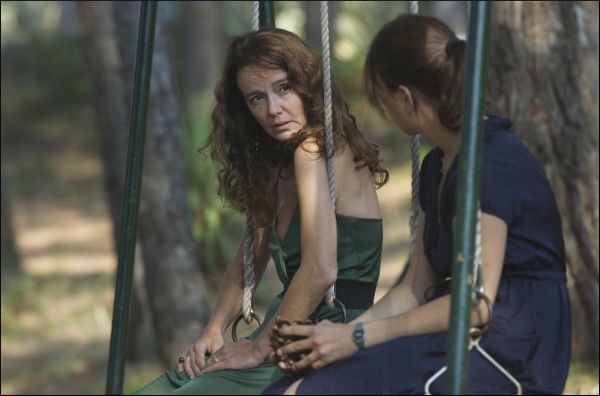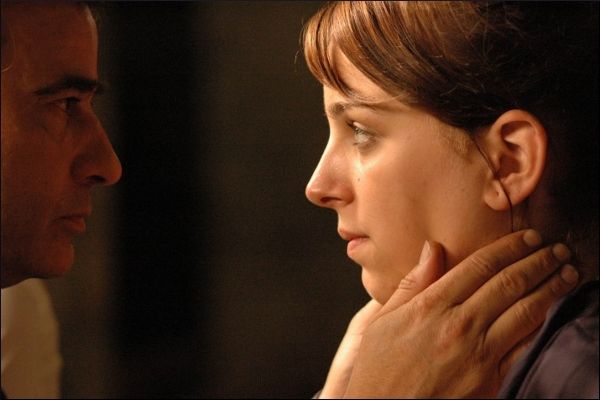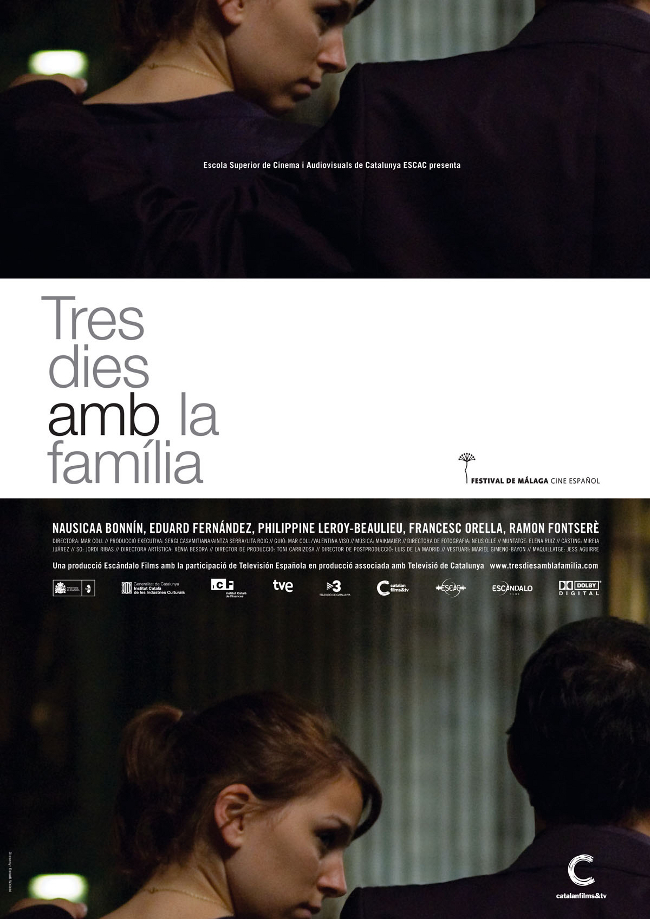Catalan director Mar Coll chose to make her professional debut with a tale about a bourgeois family suffering the death of its patriarch. Following one of his granddaughters, Lea (Nausicaa Bonnín), we enter a world of secrets and unresolved issues. Although the film is an excellent exercise in the different accents and registers of contemporary Catalan, this is also a film of silences. It begins when Lea, who is studying in France, arrives at the station of an uncertain Catalan city. We don’t hear her voice yet, but we see her calling to someone and then arriving at a hospital, where she greets her dad, who in turn confirms that her granddad has died.
Since the plot of the movie can be guessed without hearing even a word, it is quickly understood that dialogue in Tres dies amb la familia serves as a smoke screen. Many apparently harmless exchanges contribute to this idea, such as the one between two of the deceased man’s sons: “Les coses importants són per sempre”(Important things are forever), says one. “Però quines són les coses importants?” (But which are the important things?), asks the other. To which the first replies: “Tu ja ho saps” (You already know that).
"Although the film is an excellent exercise in the different accents and registers of contemporary Catalan, this is also a film of silences."
The first conversation in the film is another good example. Lea and her father (Eduard Fernández) share the tiny space of the car he is driving. After an uncomfortable silence, the father starts a conversation on his own, never waiting for answers to his questions: “Què? Què m’expliques? Què tal per Toulouse? Què tal els exàmens?” (So what? What’s up? How is everything in Toulouse? What about the exams?). Lea’s difficulties in replying show that she is hurt, bitter, and troubled, seemingly proving that she has gone to France for good and has only come back due to unexpected circumstances. But, in returning to her roots, she will later learn that there is no such thing as a perfect world, definitely not in her hometown, where her estranged parents still fake a happy marriage, and neither in France, where she struggles to convince herself that she has found relief. In the horror of her past she will unearth her real burden, the fear of rebuilding elsewhere the same false world she hates back home.

Since she almost talks through her silences, every word she does say bears a heavier weight. That is the case when her uncle asks her, “I quan tornes?” (So when are you back?), to which she replies, “Mai” (Never). Her words are vague throughout, and although there seems to be salvation after her pain, her last line is: “No, no sé” (No, I don’t know), once again inside her dad’s car, as he drives her back to the station where her journey began.
Surrounding Lea, there is an interesting group of individuals who realistically portray a typical bourgeois family. Thanks to them, this film is full of colloquial and informal Catalan, with phrases such as “Què guai” (cool) and “Carai” (damn). There are also dialects or regional variants, such as the possessive feminine pronoun “ta,” very commonly used instead of “teva,” as well as the common “Noi” (son) for calling over to someone. “És durillo” (It’s a bit difficult) is a curious construction, formed by combining the Catalan adjective “dur” (difficult) with the Spanish suffix “illo,” making the word technically wrong but actually fun and creative. Another phrase with a Spanish origin is “Va taja,” a very colloquial way of saying “to be drunk,” as the sound /x/ is a Spanish loan. In fact, not that long ago, Catalan speakers would have pronounced it with a /k/ sound, as the /x/ does not exist in Catalan. This is, for instance, the origin of words like “maco” (nice), which is just the Spanish “majo” read with a Catalan sound.
"Beneath the silences, this film hides a world of words that speak on their own."
A particular and very interesting detail in this film is how Catalan is positioned next to other languages. Since Lea’s mum is French, she will use Spanish to talk to her ex-husband and in-laws, although she understands Catalan. In this sense, Tres dies amb la familia proves that French can be as foreign as Spanish in Catalonia. When one grows up in a family where communication is developed in Catalan, that is how it happens. For Lea, while Catalan is her mother tongue, French and Spanish are secondary languages that make her naturally trilingual, just as most people in Catalonia are bilingual.
On the other hand, Lea speaks French when speaking to her boyfriend, who lives in Toulouse and whose voice is never heard through the phone, which is Lea’s escape route during her stay in Catalonia. It is not an accident, though, that Lea’s allegedly happy life takes place in France and in French, as this will become relevant during the climax. Her mum, who finally tells Lea that she should change her life if she is not fulfilled, tries to calm her daughter down in French, but Lea interrupts her: “No em parlis en francès!” (Don’t talk to me in French!), clearly angry with her not-that-happy life in France.
Beneath the silences, this film hides a world of words that speak on their own. Mar Coll (whose name can be translated as “sea and neck”) gained recognition for the maturity of her first film, a wise and frank story about what we say and what we don’t.





